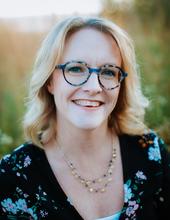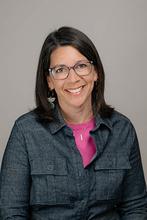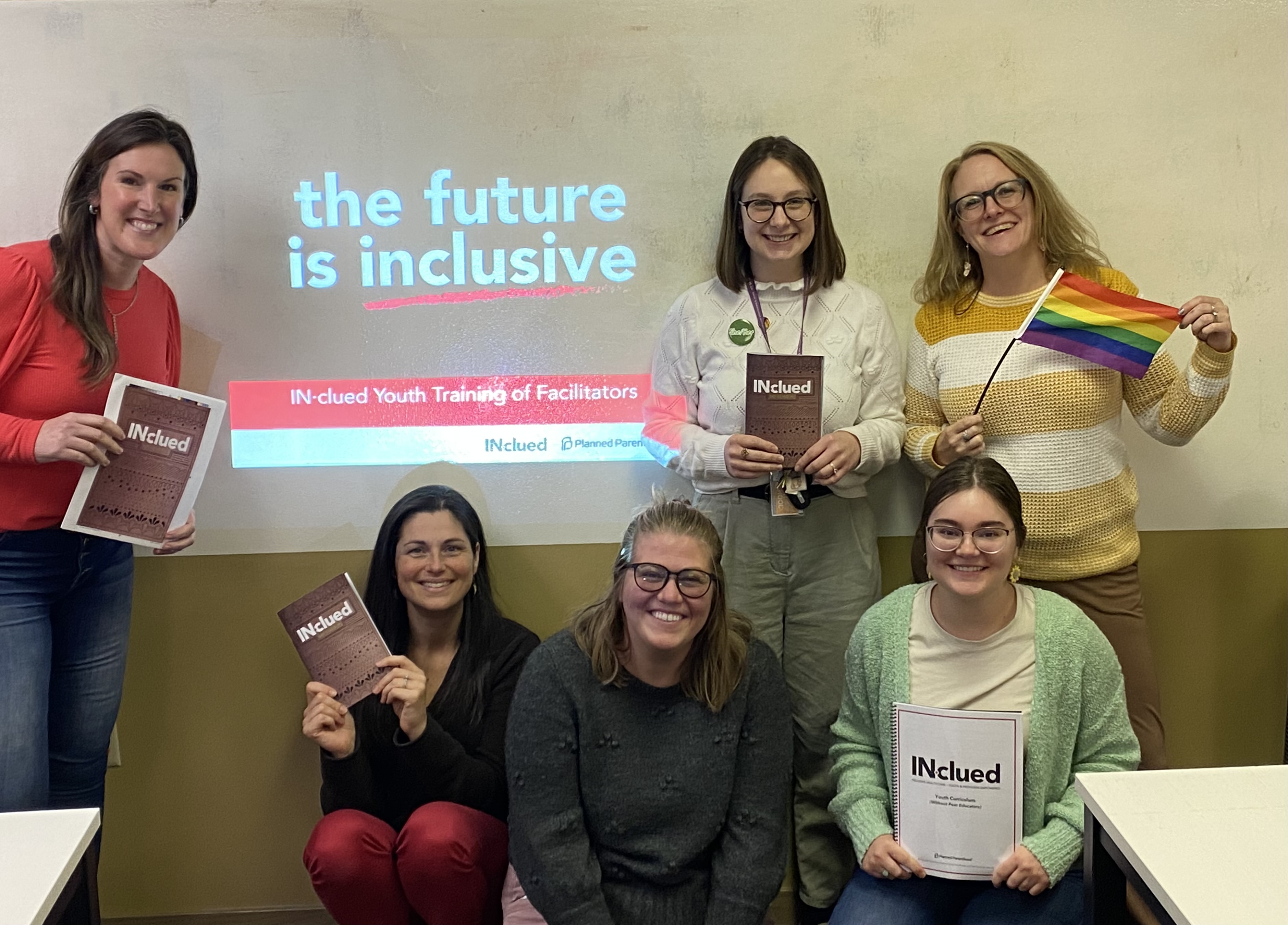How can we help your team?
We can help your team learn a new curriculum, brush up on the basics, or build your own professional development adventure, virtually or in person. Pricing correlates to training hours required, and depends on duration, format, and the number of trainers needed. Most half-day trainings start at $900; and most full-day trainings start at $1,800. We have contract experience with diverse organizational structures. Summers tend to be our busiest season, booking out 2-3 months in advance.
Our training offerings
Evidence-based sexual health curricula
All4You! & All4You2!
Be Proud! Be Responsible!
Be Proud! Be Responsible! Be Protective!
Becoming a Responsible Teen (BART)
¡Cuidate!
Draw the Line, Respect the Line
Encuentro
FLASH (Family Life and Sexual Health)
IN•clued
It's That Easy: A Guide to Raising Sexually Healthy Children
Making a Difference
Making Proud Choices
Making Proud Choices! An Adaptation for Youth in Out-of-Home Care
Positive Prevention Plus
Prime Time
Project MARS (Motivating Adolescents to Reduce Sexual Risk)
Promoting Health Among Teens - Abstinence-only
Promoting Health Among Teens - Comprehensive
Reducing the Risk
Safer Choices
Safer Sex Intervention
Seventeen Days
SHARP (Sexual Health and Adolescent Risk Behavior)
Teen Outreach Program
3Rs - Rights, Respect, Responsibility: A K-12 Sexuality Education Curriculum
Healthy Youth Development topics
Adolescent Development 101 (1-3 hrs)
Review the physical and emotional changes that occur in adolescence, practice responding to young peoples’ questions, and connect to supportive local and national resources.
Answering Young People’s Questions (2-3 hrs)
Build safe, supportive learning environments that encourage young people to ask questions, and answer them with facts, humor, and clear personal boundaries.
Circles of Sexuality (1-2 hrs)
Learn how humans experience and express their sexuality through sensuality, intimacy, identity, behavior, reproduction, and sexualization, and connect the “circles” through individual attitudes, values, and beliefs.
Coercion, Consent, and Refusal Skills: What Young People Should Know (1-2 hrs)
Learn legal contexts for consent (mandated reporting, minor’s consent), how consent culture can reduce sexual violence, and how to empower youth to assert their values and boundaries.
Creating Safe Spaces (1-2 hrs)
Grow your ability to create safe spaces through group agreements, ice-breakers, setting expectations, and designing a fun, welcoming physical environment.
Minnesota’s State of Adolescent Sexual Health (SASH) (1.5 hrs webinar, 3 hrs workshop)
Analyze the most recent Minnesota youth sexual health data and trends, compare MN to its regional and national peers, and translate this information into serving youth better.
National Sexuality Education Standards (1-3 hrs)
Review the NSES’ evidence-based recommendations for K-12 sex education core content and skills, and explore how to apply NSES in your youth-serving settings.
Seeing Young People through Rose Colored Glasses (1 - 2 hours)
Learn the basics of adolescent development, how social determinants of health can impact their ability to complete their developmental tasks, and how using this lens can build your capacity.
Sexual Orientation, Gender Identity, and Expression (1-3 hours)
Review basic terms through a social justice lens, learn the impacts of related -isms on youth, and make use of evidence-based tools for supporting and advocating for LGBTQ+ youth.
Sex-Positive Abstinence Education (1-2 hours)
Examine your personal values about abstinence, identify the positive and negative abstinence messages youth hear, and practice turning negative sexual health messages into positive ones.
Summer Institute in Adolescent Health (3 days)
Build your capacity by engaging with the latest adolescent health research, and applying it through multi-level, hands-on training. Contact Jenna Baumgartner at [email protected].
Supporting Parents and Caregivers as Sexuality Educators (2 hrs - 2 days)
Grow your capacity to support parents as they connect with their children; share their values; and engage them in meaningful conversations about sex, sexuality, and relationships.
Skills-building for healthcare professionals
Adolescent Health Summer Institute (3 days)
Build your capacity by engaging with the latest adolescent health research, and applying it through multi-level, hands-on training. For more information visit our AHSI page or contact Jenna Baumgartner at [email protected].
Design a Teen-friendly Clinic
Learn about best practices for designing and implementing a teen-friendly clinic. Learn what you can put in your clinic and how your clinic staff can be welcoming to young people. Contact Jill Farris at [email protected].
IN•clued
Address the sexual health disparities affecting LGBTQ youth with this LGBTQ-centered and evidence-based program. This dual approach combines LGBTQ youth-friendly health services with direct relevant and inclusive sex education. Contact Jill Farris at [email protected].
Minnesota Reproductive and Sexual Health Update (full day)
Increase your knowledge of the latest reproductive health practices, research, and technology at this annual training featuring keynote speakers and workshops on contraception, STI/HIV, and working with marginalized populations and diverse political contexts. Co-sponsored with Health Care Education and Training (HCET). Contact Jill Farris at [email protected].
TALK: Toolkit for Adolescent Care
Support your adolescent healthcare practice with TALK: Toolkit for Adolescent Care’s resources and training. TALK provides skills, scripts, and examples that can be put to immediate use, and can adapt to your team’s needs. Training is customizable and can range from a one-hour “Lunch and Learns” to a multi-week series of one-hour interactive sessions. format. A multi-session format builds participants’ Motivational Interviewing skills – and opportunities to apply them – using supportive one-page TALK tools. For more information visit our TALK page or contact Chris Mehus at [email protected].
YouthCHAT Educators/Advisory Board
Build the capacity of healthcare professionals and professionals-in-training through role-playing / simulations, interviews, and interventions with adolescents in clinical settings. This cohort of young educators, employed by the Division of General Pediatrics and Adolescent Health, also consult on DOGPAH projects. For more information visit our YouthChat page or contact Lynn Bretl at [email protected].
Skills-building for sexuality educators
Anatomy and Puberty (1 hour)
Develop fun and engaging presentations on the fundamentals of anatomy and puberty. We help you make it inclusive, culturally-relevant, and responsive to where your young people are now.
Answering Young People’s Questions (2-3 hours)
Build safe, supportive learning environments that encourage young people to ask questions, and answer them with facts, humor, and clear personal boundaries.
Barrier Method Demonstrations (1 hour)
Become a self-assured demonstrator of external condoms, internal condoms, and dental dams with our useful tips and opportunities for hands-on practice on anatomical models.
Coercion, Consent, and Refusal Skills: What Young People Should Know (1-2 hours)
Learn legal contexts for consent (mandated reporting, minor’s consent), how consent culture can reduce sexual violence, and how to empower youth to assert their values and boundaries.
Contraceptive Methods (1 hour)
Access UMN’s latest research and best practices in this review of contraceptive methods and teaching strategies. Practice what you learn with supportive peers.
Creating Safe Spaces (1-2 hours)
Grow your ability to create safe spaces through group agreements, ice-breakers, setting expectations, and designing a fun, welcoming physical environment.
Foundations: Core Skills-Building Workshop for Sexuality Educators (full day)
Implement high-quality sex education using any curriculum: create safe, inclusive, and fun learning environments; facilitate diverse groups with cultural sensitivity; navigate questions; and facilitate meaningful skills-building and values exploration.
Foundations: Supplemental Topics Workshops (3 hours)
Choose one of these four topics to supplement your Core Skills-Building Workshop:
- Facilitation Skills for Common Sex Education Strategies Explore some core skills for effective facilitation of commonly-used strategies in sex education programs: role-play, values exploration, sorting, and small group activities.
- Cultural Competence in Sex Education
Consider theory, diversity in students, how to identify assumptions in values statements and challenging questions, and the roles of power and privilege.
- LGBTQ+-Inclusive Sex Education
Build skills that center LGBTQ+ data, LGBTQ+ terms, creating inclusive environments, responding to challenging questions, and using the Experiential Learning Cycle.
- A Trauma-Informed Approach to Sex Education
Explore the meaning of trauma, the components of a trauma-informed approach, and how to create trauma-informed content for the young people you serve.
High Quality Facilitation (1-2 hours)
Polish your lesson planning, facilitation, and creative scaffolding, modeling, and coaching. Work in small groups to maximize each component to welcome and empower young people.
“How-to” Facilitations (1 hour - full day)
Observe your curriculum’s lessons on birth control, condoms, consent, healthy relationships, puberty and anatomy, abstinence, and STIs. Pose your “what if” questions in real time.
Minnesota Reproductive and Sexual Health Update (full day)
Increase your knowledge of the latest reproductive health practices, research, and technology at this annual training featuring keynote speakers and workshops on contraception, STI/HIV, and working with marginalized populations and diverse political contexts. Co-sponsored with Health Care Education and Training (HCET). Contact Jill Farris at [email protected].
Pregnancy Options (1-2 hours)
Learn how to bring a supportive, non-judgmental, social justice lens to your conversations with young people about abortion, adoption, parenting, values, and stigma.
Self-Disclosure and Professional Boundaries (1 hour)
Explore best practice guidelines for sex educator self-disclosure, and decide your own process and rationale for disclosing personal information when teaching sexual health education.
Sexual Orientation, Gender Identity, and Expression 101 (1-3 hours)
Review basic terms through a social justice lens, learn the impacts of related -isms on youth, and make use of evidence-based tools for supporting and advocating for LGBTQ+ youth.
Sexual Orientation, Gender Identity, and Expression 201 (1-3 hours)
Use an intersectional lens to examine heterosexual and cisgender biases, and expand your understanding of educators’ crucial role in supporting and advocating for LGBTQ+ youth.
Sex Positive Abstinence Education (1-2 hours)
Examine your personal values around abstinence, and the positive and negative abstinence messages youth hear, and practice turning negative sexual health messages into positive ones.
Sexually Transmitted Infections (1-2 hours)
Build your capacity to teach best practices (communication skills, role play) about STIs. Review common STIs, current testing and treatment guidelines, and connect to current resources.
Summer Institute in Adolescent Health (3 days)
Build your capacity by engaging with the latest adolescent health research, and applying it through multi-level, hands-on training. Contact Jenna Baumgartner at [email protected].
Teachbacks (1 hour - full day)
Practice facilitating various activities from the curriculum of your choice in a space full of sex education trainers and fellow educators who are rooting for you.
Technical assistance for any audience
Educate your school board about sex ed
Write a pro-sexuality-education “pitch” and responses to the opposition’s talking points, and role play the key players (Superintendent, School Board, speakers) to prep for a successful school board meeting.
Choose a sex ed curriculum
Are you having trouble selecting a sex ed curriculum for your program, school or district? We can help you identify your goals and standards you would like to address and help match a curriculum to fit your needs.
Plan your sex ed curriculum
Sex Ed curriculums are not always one-size-fits all. If you are not finding what you need from one curriculum, we can help you develop an education plan that incorporates your goals and objectives for your program, school or district.
Evaluate your sex ed curriculum
Develop plans to analyze program processes (including fidelity, implementation, program adaptations) and outcomes (including objectives, usability, acceptability) by partnering with us to create evaluation questions, methods, and a timeline.
Onboard and support your organization’s sex ed staff
Is sex education new to your organization, your bandwidth is stretched and you could use support, or you are just looking for new ways to shake up your on-boarding experience? We can help you build a comprehensive on-boarding plan catered to new and tenured sex educators.
Capacity-building for State Adolescent Health Coordinators and MCH professionals
We have a variety of tools and resources to help State Adolescent Health Coordinators and other state level public health professionals champion young people. And we love to share our expertise in strategic planning, youth engagement structures, and other Title V/MCH programs and initiatives focused on AYA health and performance measures.
Youth Advisory Boards for the Win
Is your organization seeking to engage youth in leadership development? We can support you in a step-by-step process, including an internal needs assessment for your organization, to meaningfully engage youth in an advisory board for your organization.
Using Strategic Communications to Build Community Support for Sex Ed (1-2 hours)
90% of MN parents support K-12 sexuality education in schools, urban or rural, conservative or liberal, religious or not. Learn how to spread the word, respectfully, where you live.
Our trainers

Jill Farris, MPH is the Director of Adolescent Sexual Health Training and Education at the Healthy Youth Development - Prevention Research Center at the University of Minnesota. As Director of the training department, she leads capacity building initiatives to strengthen community-based adolescent sexual health programs, and has significant expertise in the essential skills needed to facilitate sexual health programming. Farris is a certified trainer on nearly two dozen evidence-based interventions to prevent teen pregnancy and HIV/STIs, and is a nationally recognized expert on program fidelity, adaptation and implementation. She leads the creation and dissemination of the annual Adolescent Sexual Health Report, as well as county health reports and data visualization fact sheets that are widely utilized by youth-serving agencies and professionals. Farris is deeply committed to addressing health disparities, and delivers content through a lens of equity, inclusion, and trauma-informed practice.

Lynn Bretl, MPP, YouthCHAT / Youth Advisory Board Program Manager, has extensive experience supporting youth-serving and other public health professionals in implementing science-based approaches and translating research in best practices in AYAH into actionable practice and policy. Bretl’s expertise includes strategies for implementing Positive Youth Development approaches, the foundations of healthy adolescent development, sexual health education, and clinical services for young people. Bretl also serves as a faculty instructor for the UMN’s LEAH program, and is an Adjunct Instructor in the School of Public Health where she teaches a course on Sexuality Education Programs, Practices and Policies in the U.S. She endeavors to always incorporate what she has learned from working directly with young people, their families and communities, whether as a health educator, clinical case manager, or softball coach.

Javiera (Javi) Monardez Popelka, MD, MPH, is the co-founder of Familia Solutions, which supports organizations in providing culturally sensitive health resources for Latino families. She has participated in various research and community interventions with different universities, including the University of Minnesota, the University of Maryland, and the University of Florida. She worked as a parent educator and outreach specialist for Hennepin Healthcare's programs Between Us and Aqui Para Ti for eight years, creating resources and training related to reproductive health and sex trafficking prevention for teens, their parents, and health providers. Monardez Popelka has more than 15 years of experience in healthcare and education, from one-on-one settings as a physician back in Chile and as a health coach in the US to group settings as a community educator and trainer for trainers in different health-related curriculums. She also has vast experience in outreach, needs assessment, and curriculum development and adaptation based on community needs.

Caitlin O’Fallon, Trainer, has more than 13 years of experience in the field of sexuality education as a professional trainer, facilitator and youth worker in Minneapolis. She received a certificate of Sexuality Education from Planned Parenthood University in 2016. She is a certified facilitator and trainer of several nationally recognized sex ed curriculum including Positive Prevention Plus, Foundations, Making Proud Choices, Teen Council and IN.Clued, the only nationally recognized sex ed program designed by and for LGBTQ youth.

